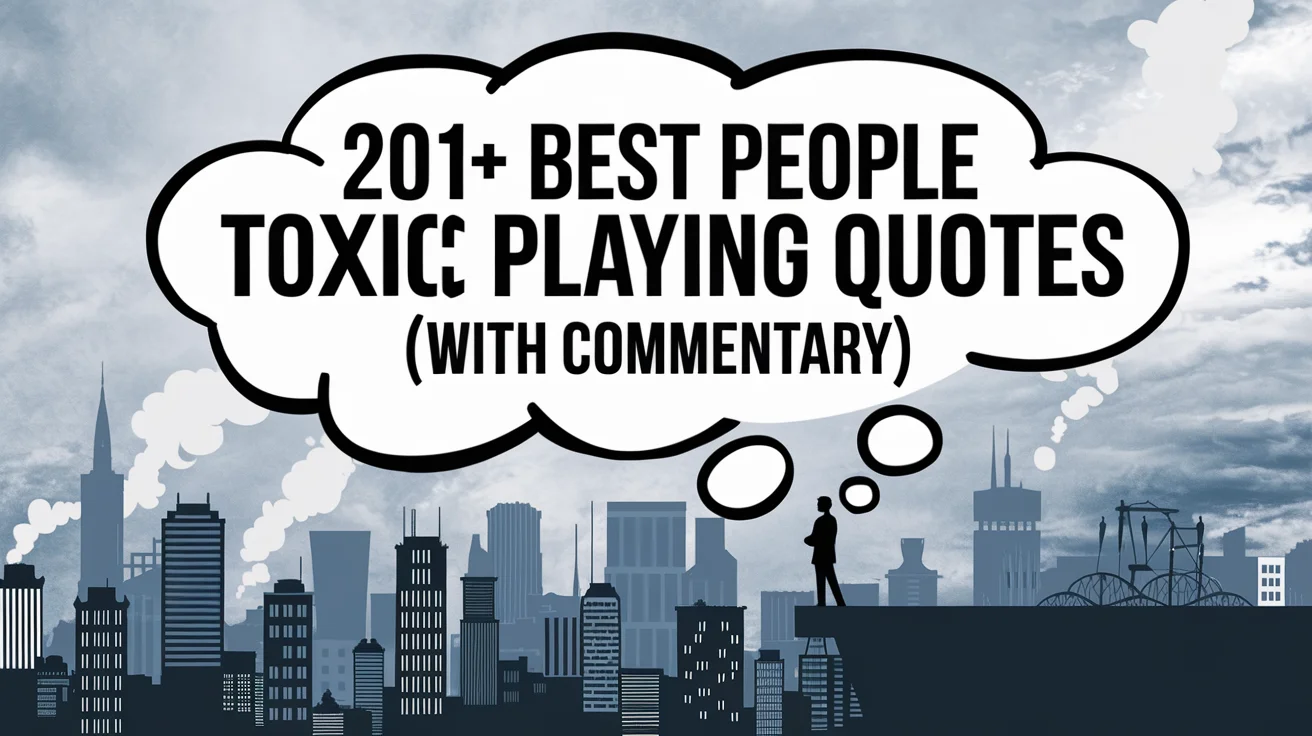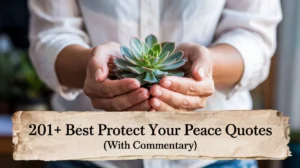Explore powerful Toxic Playing Victim Quotes that shed light on manipulative behaviors and help you spot emotional manipulation in relationships. Toxic people often manipulate others by playing the victim, portraying themselves as the innocent ones while shifting blame for their actions.
They create an environment where they consistently seek sympathy and validation, all while escaping accountability. In this collection, we will explore over 201+ powerful quotes, each providing insight into the toxic behavior of playing the victim, along with commentary to understand the dynamics at play.
These quotes not only shed light on the behavior of such individuals but also encourage self-reflection and awareness.
Recognizing the Victim Mentality
- “The victim mentality keeps you trapped in the past, unable to move forward.”
- “People who play the victim often find it easier to blame others than take responsibility.”
- “They don’t want solutions, they just want attention.”
- “A true victim rises above their struggles, not wallows in them.”
- “Playing the victim is a tactic to manipulate others into sympathy.”
- “The victim mindset allows you to avoid personal growth.”
- “It’s easy to play the victim when you refuse to acknowledge your part in the problem.”
- “No one is a permanent victim unless they allow themselves to be.”
- “Victimhood doesn’t make you stronger; it makes you weaker.”
- “Being a victim is an excuse, not a solution.”
- “Toxic people love to wear the victim card as a shield.”
- “Blaming others is easier than accepting your flaws.”
- “When you play the victim, you give away your power to others.”
- “Victims don’t heal by staying stuck in the same story.”
- “Those who thrive on victimhood rarely admit their own mistakes.”
- “The victim mentality is a defense against personal responsibility.”
- “By playing the victim, you hand over control of your life to others.”
- “Real empowerment comes when you stop being the victim of your circumstances.”
- “The moment you stop playing the victim, you gain back your strength.”
- “Victims are always surrounded by problems, but never solutions.”
The Manipulative Nature of Playing the Victim
- “Manipulation begins the moment you start playing the victim.”
- “Victims never have to change; it’s always someone else’s fault.”
- “Toxic people use victimhood to get what they want without earning it.”
- “Victim-playing is a way to manipulate people into feeling sorry for you.”
- “The art of manipulation is making others believe you’re always the victim.”
- “Playing the victim makes you feel justified in your actions, no matter how wrong they are.”
- “Victims create chaos to avoid personal responsibility.”
- “The victim card is often used as a shield to hide true intentions.”
- “It’s easier to play the victim than admit your faults.”
- “When you become the victim, you divert attention from your shortcomings.”
- “Playing the victim helps avoid confrontation and personal growth.”
- “Manipulative individuals wear the victim mask until it becomes their true identity.”
- “If someone’s always the victim, their behavior may be more toxic than they admit.”
- “You can’t manipulate people when you’re no longer seen as the victim.”
- “Victimhood often masquerades as helplessness, but it’s a form of power.”
- “Behind every victim is a person afraid of taking responsibility.”
- “When you play the victim, you weaken your credibility.”
- “People who constantly play the victim will eventually push others away.”
- “Victimhood is an easy way to avoid accountability.”
- “The victim narrative gives you the power to control others’ perceptions.”
The Psychological Impact of Playing the Victim
- “Playing the victim takes a toll on your mental health.”
- “The more you see yourself as a victim, the more powerless you become.”
- “Victim mentality keeps you stuck in a loop of negativity.”
- “By choosing to be a victim, you shut out any chance of healing.”
- “The victim role undermines your confidence and self-worth.”
- “The more you play the victim, the more you lose your ability to stand up for yourself.”
- “Playing the victim is an unconscious way of avoiding deeper emotional pain.”
- “Victimhood often prevents people from realizing their potential.”
- “A victim mindset leads to constant dissatisfaction with life.”
- “The psychological toll of victimhood is often more damaging than the original wound.”
- “The victim mentality keeps you in a state of perpetual anxiety.”
- “People who play the victim feel helpless and lack self-esteem.”
- “By continuously seeing yourself as a victim, you lose touch with reality.”
- “The emotional cost of being a victim is far higher than people realize.”
- “You’re not just a victim; you’re a person capable of change if you stop playing that role.”
- “People who play the victim have often been hurt, but they never allow themselves to heal.”
- “The longer you cling to victimhood, the more you reinforce your suffering.”
- “Playing the victim keeps you from understanding your emotions and why you feel them.”
- “Victim mentality is a barrier to emotional resilience.”
- “Every time you play the victim, you lower your emotional intelligence.”
Read More: 201+ Best People Taken For Granted Quotes (with Commentary)
Accountability vs Playing the Victim
- “Taking accountability means dropping the victim act and owning your mistakes.”
- “Accountability allows you to grow; victimhood keeps you stagnant.”
- “Acknowledge your flaws instead of blaming others for your failures.”
- “The act of playing the victim is a form of avoiding responsibility.”
- “True strength comes from owning your actions, not playing the victim.”
- “People who take accountability empower themselves; those who play the victim disempower themselves.”
- “To move forward in life, you must stop playing the victim and start accepting responsibility.”
- “Playing the victim will never lead you to personal growth or success.”
- “The key to growth is taking accountability, not casting blame.”
- “Accountability is a sign of maturity while playing the victim is a sign of immaturity.”
- “Stop blaming others and take responsibility for your choices.”
- “The victim mentality is rooted in a refusal to accept responsibility for your actions.”
- “A life without accountability is a life stuck in victimhood.”
- “Victimhood is an escape from the uncomfortable truth of accountability.”
- “The more you play the victim, the less accountable you become.”
- “Growth starts when you stop playing the victim and take full accountability.”
- “Accountability is empowering; playing the victim is disempowering.”
- “Refusing accountability for your actions is the first step in becoming a victim.”
- “Playing the victim is an easy way out; true power comes with owning your decisions.”
- “Accountability removes the need to play the victim.”
How Victimhood Affects Relationships
- “Toxic victimhood can destroy trust in any relationship.”
- “The victim role creates distance between people who care about you.”
- “Victimhood often clouds the truth, making it hard to have honest relationships.”
- “Relationships suffer when one person constantly plays the victim.”
- “Victim mentality isolates you from the people who truly want to help.”
- “When you’re always the victim, you build walls between yourself and others.”
- “Victimhood creates conflict in relationships because no one feels heard.”
- “Victim mentality poisons the communication in any relationship.”
- “A victim mindset often leads to unrealistic expectations from others.”
- “The victim role is an emotional drain for those around you.”
- “Relationships thrive on honesty, not playing the victim.”
- “Constantly seeing yourself as a victim will push your loved ones away.”
- “Victimhood prevents you from connecting with others on a deeper level.”
- “When you play the victim, you rob others of the chance to support you effectively.”
- “A victim mindset keeps you from being vulnerable and open with those you love.”
- “Being stuck in victimhood prevents healthy emotional exchanges in relationships.”
- “Victims rarely can offer empathy to others.”
- “The need to always be the victim erodes mutual respect in relationships.”
- “Victimhood leads to manipulation, which creates an unhealthy dynamic in relationships.”
- “Playing the victim in relationships fosters resentment and bitterness.”
The Emotional Consequences of Playing the Victim
- “Victimhood feeds negative emotions and prevents healing.”
- “Emotions of anger and sadness often stem from playing the victim.”
- “When you play the victim, your emotional stability is compromised.”
- “Constantly portraying yourself as a victim keeps you emotionally exhausted.”
- “The more you indulge in victimhood, the more it consumes your emotional energy.”
- “Emotional growth stops when you adopt the victim mentality.”
- “Victimhood brings a constant cycle of self-pity and resentment.”
- “The emotional burden of being a victim can cloud your perspective on life.”
- “Playing the victim makes you emotionally dependent on the sympathy of others.”
- “Self-pity is a poison that thrives on victimhood.”
- “People who play the victim often feel emotionally drained and defeated.”
- “By remaining a victim, you close the door to emotional healing.”
- “Victimhood keeps you in a constant state of emotional instability.”
- “Playing the victim strips away emotional resilience.”
- “The emotional cost of playing the victim outweighs any short-term gains.”
- “Emotional freedom comes when you release the victim mentality.”
- “Victims often feel trapped in their own emotions without the tools to break free.”
- “The emotional toll of being a victim affects not only you but those around you.”
- “Self-pity robs you of the emotional strength needed to overcome difficulties.”
- “By playing the victim, you disconnect yourself from your true emotional power.”
Read Also: 201+ Best People Verbal Abuse Quotes (with Commentary)
The Cycle of Self-Victimization
- “Self-victimization is a repetitive cycle that never leads to growth.”
- “Once you start self-victimizing, it becomes difficult to break free.”
- “Every time you self-victimize, you reinforce your inability to change.”
- “Self-victimization keeps you stuck in the past, preventing forward movement.”
- “The cycle of self-victimization perpetuates feelings of helplessness.”
- “When you keep seeing yourself as a victim, you avoid confronting real issues.”
- “The longer you stay in the cycle of self-victimization, the harder it becomes to escape.”
- “Self-victimization convinces you that you’re powerless, even when you’re not.”
- “Each round of self-victimization pushes you further into emotional stagnation.”
- “The cycle of self-victimization makes you view challenges as insurmountable.”
- “Breaking free from self-victimization is a key step in personal growth.”
- “Self-victimization traps you in a false narrative of helplessness.”
- “Self-victimization feeds into a story that you’re always at the mercy of others.”
- “People who self-victimize often miss the chance to turn challenges into opportunities.”
- “The cycle of self-victimization is reinforced by a constant need for sympathy.”
- “Self-victimization prevents you from recognizing your strength.”
- “Once you break the cycle of self-victimization, empowerment follows.”
- “Self-victimization creates a distorted view of reality, where you’re always the martyr.”
- “The more you self-victimize, the more you reinforce the belief that you can’t change.”
- “The cycle of self-victimization often traps people in a continuous state of negativity.”
Victimhood as a Defense Mechanism
- “Victimhood is often used as a defense mechanism to avoid dealing with uncomfortable truths.”
- “People use victimhood to deflect attention away from their shortcomings.”
- “The defense mechanism of victimhood shields you from facing difficult emotions.”
- “By playing the victim, you avoid confronting your actions or mistakes.”
- “Victimhood can be a way of hiding from your fears and insecurities.”
- “Using victimhood as a defense mechanism keeps you in denial about your role in situations.”
- “The victim role can be a way of escaping accountability for your choices.”
- “Playing the victim deflects criticism and places the focus on others instead of yourself.”
- “Victimhood acts as a buffer against facing your emotional or psychological wounds.”
- “People often play the victim to protect their ego from criticism.”
- “Victimhood can be a protective shield against rejection or failure.”
- “By adopting a victim mentality, you protect yourself from the vulnerability of change.”
- “Victimhood can act as an emotional wall that prevents others from truly understanding you.”
- “The defense mechanism of victimhood creates distance between you and personal growth.”
- “Victimhood offers a temporary sense of safety, but it keeps you from real progress.”
- “When you play the victim, you deny the opportunity for self-reflection.”
- “The victim defense mechanism allows you to avoid responsibility while still seeking sympathy.”
- “Victimhood can be used as a tactic to get others to feel sorry for you instead of addressing your flaws.”
- “By assuming the role of a victim, you avoid taking responsibility for the emotions you’re experiencing.”
- “Victimhood as a defense mechanism makes it hard to build genuine, trusting relationships.”
The Role of Society in Encouraging Victim Mentality
- “Society often rewards victimhood, encouraging people to stay in a perpetual state of helplessness.”
- “The culture of victimhood in society undermines individual accountability.”
- “Society’s tendency to favor the victim narrative often keeps people from developing resilience.”
- “By focusing on victimhood, society ignores the need for personal responsibility and growth.”
- “The constant reinforcement of victimhood in media perpetuates the cycle of blame.”
- “Victimhood is often glamorized by society, making it harder to break free from it.”
- “Society often fails to teach individuals how to overcome adversity and instead glorifies victimhood.”
- “The pressure to be a victim comes from a society that overemphasizes sympathy over strength.”
- “By placing the blame on others, society excuses personal accountability.”
- “In a society that encourages victimhood, it’s easy to feel powerless.”
- “The focus on victimhood in society can diminish the importance of self-empowerment.”
- “In many cases, society’s sympathy for victims keeps individuals from taking control of their lives.”
- “Victimhood becomes a convenient identity when society values it more than personal responsibility.”
- “The narrative of victimhood in society fuels feelings of entitlement and bitterness.”
- “Society often teaches people that being a victim is a way to gain attention and sympathy.”
- “When society rewards victimhood, it perpetuates feelings of inadequacy and helplessness.”
- “Society’s obsession with victimhood breeds a culture of passivity rather than proactive change.”
- “The victim mentality thrives in a society that constantly provides excuses for inaction.”
- “Society’s victim culture encourages people to stay stuck in their trauma rather than moving past it.”
- “In a society focused on victimhood, personal empowerment often takes a backseat.”
Read Also: 201+ Best People Mother’s Day in Heaven Quotes (with Commentary)
Shifting from Victimhood to Empowerment
- “True empowerment begins the moment you take responsibility for your life.”
- “The shift from victimhood to empowerment requires a mindset change.”
- “Empowerment comes when you let go of the need to blame others for your misfortunes.”
- “When you take control of your narrative, victimhood has no place in your life.”
- “Empowerment starts with breaking free from the victim mentality.”
- “The transition from victimhood to empowerment is the ultimate path to personal freedom.”
- “Taking ownership of your actions is the first step toward empowerment.”
- “When you stop playing the victim, you unlock the door to empowerment.”
- “Empowerment is the realization that you are not defined by your past victimhood.”
- “Letting go of the victim mindset opens the door to endless possibilities for growth.”
- “Empowerment requires embracing your strengths and learning from your struggles.”
- “True empowerment happens when you stop waiting for others to save you.”
- “The power to change your life lies in your ability to reject victimhood.”
- “Empowerment begins with self-reflection and the courage to make different choices.”
- “The more you let go of victimhood, the more empowered you become.”
- “Empowerment is about creating your own story, not letting others define it for you.”
- “Shifting from victimhood to empowerment requires radical self-acceptance.”
- “The process of empowerment begins when you stop blaming and start changing.”
- “You hold the power to transform your life by letting go of the victim mindset.”
- “Empowerment is a choice, and it begins when you decide not to remain a victim.”
Final Thought:
Reclaim your life from the grip of victimhood. Empowerment lies not in playing the victim but in taking responsibility for your actions, emotions, and growth. Break free from the cycle of blame and step into your true power. The path to a fulfilling life begins with choosing to leave the victim mentality behind.

Bella Marie is a creative writer and the imaginative mind behind Quotes Nexus. With a passion for expressing the beauty of life through words, Bella crafts quotes that inspire and uplift. Her writing captures the essence of love, friendship, and personal growth, making her a beloved voice among readers who seek motivation and connection.













